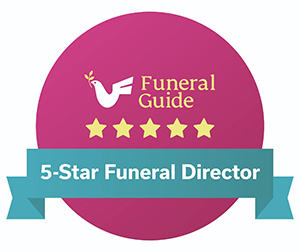A Private Chapel of Rest
The chapel of rest is a quiet, dignified environment in which friends and family can pay their last respects to their loved one. Each of our offices has its own private chapel of rest. In order to make your visit as peaceful as possible, appointments need to be made and the following guidance should be noted.
Once funeral arrangements have been made and confirmed, we suggest that at least three working days should be left before families begin to request appointments at the chapel of rest. This gives time for the completion of paperwork, the preparation of the coffin and the care of the deceased. Please be aware that three days is only a guide and on occasion may have to be extended depending on individual circumstances. In all instances we will call you once your loved one is in the care of your chosen chapel of rest.
Chapel of Rest Etiquette
The etiquette in the chapel of rest is usually more relaxed than at the funeral itself, but you should always check with us and definitely the family or next of kin of the deceased for any specific guidelines.
The most common questions at this time are around speaking in the Chapel of Rest, what to wear, taking pictures and in current circumstances how the Covid-19 pandemic affects the process.
Talking in the Chapel of Rest
There are not usually any rules around not speaking when mourners visit the deceased person in the chapel. It’s often a time for final words, so while this is perfectly normal, it’s always worth thinking about the volume of what you say and of course the language. It’s certainly not a time for airing grievances.
How to dress when visiting the Chapel of Rest
Unless there are cultural or religious reasons for wearing specific clothes in the chapel of rest there is not usually any formal etiquette with regards to dress. However, you may wish to dress in a certain way as a mark of respect, or even as a fun memory, always remember to be respectful though, dress should not be inappropriate.
Taking Pictures
This is generally frowned upon but is acceptable in some cultures, we do not encourage it on a general basis. You should always be mindful whether or not the family may be further upset by you taking photos. Unless you have been given implicit permission, you must not use a camera, phone or recording device in the Chapel of Rest.
Can I see my relative in the Chapel of Rest during the Pandemic?
We believe that a last goodbye is so important to families, especially during this time when many are unable to visit their loved ones before they pass away due to restrictions at Hospitals and Nursing Homes. We have closely followed the advice from Public Health England. They have not put in place restrictions on relatives visiting the Chapel of Rest, even if your relative has passed away of the coronavirus.
Our only restriction is that we request that only 2 family members at a time attend the Chapel of Rest but we will work with you to ensure that everyone who wishes to visit is able to do so.
Our professional staff work safely and are provided with the recommended PPE, meaning that we are able to care for your loved one no matter the circumstances that led to their passing. For your safety and that of our dedicated colleagues, we will ask your permission to carry out a procedure called embalming, which will ensure that your loved one continues to rest peacefully whilst in our care. You can even supply a favourite outfit for your loved one to be dressed in or if you prefer, we can supply a suitable gown for them.
Coronavirus and Frequently Asked Questions
To come to terms with the death of a loved one it’s natural that you will want to mourn properly but the coronavirus pandemic has bought its own set of challenges. If a person is isolating or showing symptoms it may not always be safe for them to attend a funeral or visit the Chapel of Rest and social distancing will have an inevitable effect on the way funerals can be carried out.
To reduce the risk of transmitting coronavirus only the following should attend funeral services:
- Members of the deceased person’s household
- close family members
- or close friends if the above cannot attend
- A celebrant of choice as requested by the family






